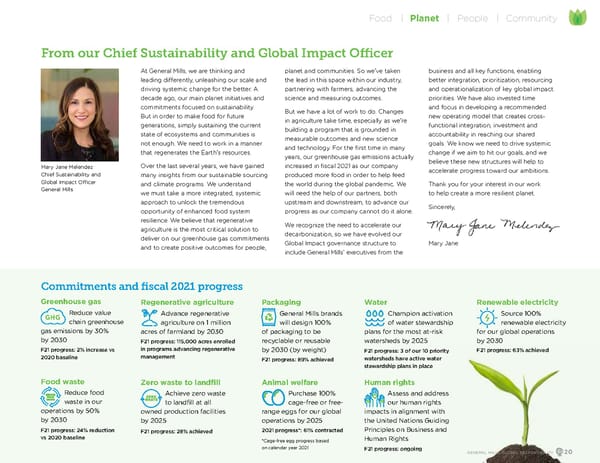At General Mills, we are thinking and leading differently, unleashing our scale and driving systemic change for the better. A decade ago, our main planet initiatives and commitments focused on sustainability. But in order to make food for future generations, simply sustaining the current state of ecosystems and communities is not enough. We need to work in a manner that regenerates the Earth’s resources. Over the last several years, we have gained many insights from our sustainable sourcing and climate programs. We understand we must take a more integrated, systemic approach to unlock the tremendous opportunity of enhanced food system resilience. We believe that regenerative agriculture is the most critical solution to deliver on our greenhouse gas commitments and to create positive outcomes for people, planet and communities. So we’ve taken the lead in this space within our industry, partnering with farmers, advancing the science and measuring outcomes. But we have a lot of work to do. Changes in agriculture take time, especially as we’re building a program that is grounded in measurable outcomes and new science and technology. For the first time in many years, our greenhouse gas emissions actually increased in fiscal 2021 as our company produced more food in order to help feed the world during the global pandemic. We will need the help of our partners, both upstream and downstream, to advance our progress as our company cannot do it alone. We recognize the need to accelerate our decarbonization, so we have evolved our Global Impact governance structure to include General Mills’ executives from the business and all key functions, enabling better integration, prioritization, resourcing and operationalization of key global impact priorities. We have also invested time and focus in developing a recommended new operating model that creates cross- functional integration, investment and accountability in reaching our shared goals. We know we need to drive systemic change if we aim to hit our goals, and we believe these new structures will help to accelerate progress toward our ambitions. Thank you for your interest in our work to help create a more resilient planet. Sincerely, Mary Jane From our Chief Sustainability and Global Impact Officer Mary Jane Melendez Chief Sustainability and Global Impact Officer General Mills GENERAL MILLS GLOBAL RESPONSIBILITY 20 Food Planet People Community Greenhouse gas Reduce value chain greenhouse gas emissions by 30% by 2030 Food waste Reduce food waste in our operations by 50% by 2030 Regenerative agriculture Advance regenerative agriculture on 1 million acres of farmland by 2030 Zero waste to landfill Achieve zero waste to landfill at all owned production facilities by 2025 Packaging General Mills brands will design 100% of packaging to be recyclable or reusable by 2030 (by weight) Animal welfare Purchase 100% cage-free or free- range eggs for our global operations by 2025 Water Champion activation of water stewardship plans for the most at-risk watersheds by 2025 Human rights Assess and address our human rights impacts in alignment with the United Nations Guiding Principles on Business and Human Rights Renewable electricity Source 100% renewable electricity for our global operations by 2030 GHG F21 progress: 2% increase vs 2020 baseline F21 progress: 24% reduction vs 2020 baseline F21 progress: 115,000 acres enrolled in programs advancing regenerative management F21 progress: 28% achieved F21 progress: 89% achieved 2021 progress*: 61% contracted *Cage-free egg progress based on calendar year 2021 F21 progress: 3 of our 10 priority watersheds have active water stewardship plans in place F21 progress: ongoing F21 progress: 63% achieved Commitments and fiscal 2021 progress
 GeneralMills Global Responsibility Report Page 21 Page 23
GeneralMills Global Responsibility Report Page 21 Page 23